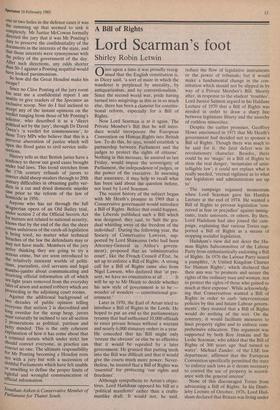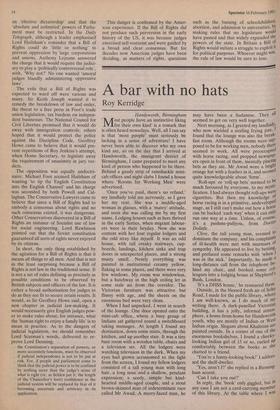A Bill of Rights
Lord Scarman's foot
Shirley Robin Letwin
("Irice upon a time it was proudly recog- nised that the English constitution is, as Dicey said, 'a sort of maze in which the wanderer is perplexed by unreality, by antiquarianism, and by conventionalism.' Since the second world war, pride having turned into misgivings in this as in so much else, there has been a clamour for constitu- tional reform, especially for a Bill of Rights.
Now Lord Scarman is at it again. The Private Member's Bill that he will intro- duce would incorporate the European Convention on Human Rights into British law. To do this, he says, would establish 'a partnership between Parliament and the judges to protect the rights of citizens'.
Nothing in this measure, he assured us last Friday, would impair the sovereignty of Parliament, the independence of judges, or the power of the executive. In assessing that assurance, it may help to recall what has been said about the question before, not least by Lord Scarman.
The recent history of the subject began with Mr Heath's promise in 1969 that a Conservative government would introduce a Bill of Rights. Before that could happen, the Liberals published such a Bill which was designed, they said, to 'halt the gra- dual whittling away of the freedom of the individual'. During the following year, the Society of Conservative Lawyers, sup- ported by Lord Shawcross (who had been Attorney-General in Attlee's govern- ment), proposed that an 'administrative court', like the French Conseil d'Etat, be set up to enforce a Bill of Rights. A strong call for a Bill of Rights came also from Nigel Lawson, who declared that 'at pre- sent, we have no constitution at all . . . . It will be up to Mr Heath to decide whether his new style of government is to be wonder of wonders — constitutional gov- ernment.'
Later in 1970, the Earl of Arran tried to intoduce a Bill of Rights in the Lords. He hoped to put an end to the parliamentary tyranny that had authorised 10,000 officials to enter private houses without a warrant and nearly 6,000 statutory orders in a year.
He conceded that his Bill might only 'restate the obvious' or else be so effective that it would be repealed by a later government. He granted that putting teeth into the Bill was difficult and that it would give the courts much more power. Never- theless, he insisted that a Bill of Rights was 'essential' for protecting 'our rights and freedoms'.
Although sympathetic to Arran's objec- tives, Lord Hailsham opposed his bill as a 'political manifesto' rather than a crafts- manlike draft. It would not, he said, reduce the flow of legislative instruments or the power of tribunals; but it would make a fundamental change in the con- stitution which should not be slipped in by way of a Private Member's Bill. Shortly after, in response to the student 'troubles', Lord Justice Salmon argued in his Haldane Lecture of 1970 that a Bill of Rights was needed in order to draw a sharp line between legitimate liberty and the anarchy of ruthless minorities.
Despite the earlier promises, Geoffrey Howe announced in 1971 that Mr Heath's government had decided not to sponsor a Bill of Rights. Though there was much to be said for it, the fatal defect was its revolutionary character. Besides, there could be no 'magic' in a Bill of Rights to stem the real danger, 'mountains of unin- telligible law'; it could not replace what is really needed, 'eternal vigilance as to what our 'legislators and administrators are up to'.
The campaign regained momentum when Lord Scarman gave his Hamlyn Lecture at the end of 1974. He wanted a Bill of Rights to prevent legislation 'con- ceived in fear or prejudice' against immig- rants, trade unionists, or others. By then, Lord Hailsham had also joined the cam- paign, explaining that various Tories sup- ported a Bill of Rights as a means of stopping socialist legislation.
Hailsham's view did not deter the Hu- man Rights Subcommittee of the Labour Party from enthusiastically endorsing a Bill of Rights. In 1976 the Labour Party issued a pamphlet, 'A United Kingdom Charter for Human Rights', which declared that their aim was `to promote and secure the rights of the ordinary man and woman, not to protect the rights of those who gained so much at their expense'. While acknowledg- ing that Conservatives wanted a Bill of Rights in order to curb 'interventionist policies by this and future Labour govern- ments', they insisted that a Bill of Rights would do nothing of the sort. On the contrary, it would facilitate measures to limit property rights and to enforce com- prehensive education. This argument was supported by both Roy Jenkins and Sir Leslie Scarman, who added that the Bill of Rights of 300 years ago 'had turned to water'. Michael Zander, of the LSE law department, affirmed that the European Convention specifically permitted the state 'to enforce such laws as it deems necessary to control the use of property in accord- ance with the general interest'.
None of this discouraged Tories from advocating a Bill of Rights. In his Dimb- leby Lecture of October, 1976, Lord Hail- sham declared that Britain was living under an 'elective dictatorship' and that the `absolute and unlimited' powers of Parlia- ment must be restricted. In the Daily Telegraph, although a leader emphasised Lord Hailsham's reminder that a Bill of Rights could do 'little or nothing' to prevent oppression by large corporations and unions, Anthony Lejeune answered the charge that it would require the judici- ary to play a 'politically controversial role', with, 'Why not?' No one wanted 'amoral judges blandly administering oppressive laws'.
The evils that a Bill of Rights was expected to ward off were various and many. Sir Keith Joseph wanted it to remedy the breakdown of law and order, the threat to a free press in Foot's trade union legislation, tax burdens on indepen- dent businesses. The National Council for Civil Liberties promised that it would do away with immigration controls; others hoped that it would protect the police against the Discipline Code. Geoffrey Howe came to believe that it would pre- vent repetitions of Roy Jenkins's attempt, when Home Secretary, to legislate away the requirement of unanimity in jury ver- dicts.
The opposition was equally undoctri- naire. Michael Foot accused Hailsham of wanting `to tip the English Constitution into the English Channel' and his charge was seconded by both Powell and Cal- laghan. The Conservative Lawyers came to believe that since a Bill of Rights had to embody a consensus about rights and no such consensus existed, it was dangerous. Other Conservatives discovered in a Bill of Rights an instance of Socialist use of law for social engineering. Lord Rawlinson pointed out that the Soviet constitution guaranteed all sorts of rights never enjoyed by its citizens.
In short, the only thing established by the agitation for a Bill of Rights is that it means all things to all men. And that is not in the least surprising because a Bill of Rights is not law in the traditional sense. It is not a set of rules defining as precisely as possible conditions to be observed by British subjects and officers of the law. It is rather a broad authorisation for judges to do as they see fit to secure cetain results. It would, as Sir Geoffrey Howe said, open a new chapter in judicial law-making. It would necessarily give English judges pow- er to make rules about, for instance, what the 'human right to enjoy a family life' is to mean in practice. As to the dangers of judicial legislation, we should remember Lord Scarman's words, delivered to re- prove Lord Denning: the Constitution's separation of powers, or more accurately functions, must be observed if judicial independence is not to be put at risk. For, if people and parliament come to think that the judicial power is to be confined by nothing more than the judge's sense of what is right (or, as Selden put it, the length of the Chancellor's foot) confidence in the judicial system will be replaced by fear of it becoming uncertain and arbitrary in its application. This danger is confirmed by the Amer- ican experience. If the Bill of Rights did not produce such perversion in the early history of the US, it was because judges exercised self-restraint and were guided by a broad and clear consensus. But for decades now American judges have been deciding, as matters of rights, questions such as the bussing of schoolchildren, abortion, and admission to universities, by making rules that no legislature would have passed and that widely expanded the powers of the state. In Britain a Bill of Rights would initiate a struggle to exploit it for political purposes. Whoever might win, the rule of law would be sure to lose.















































 Previous page
Previous page